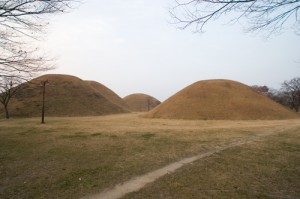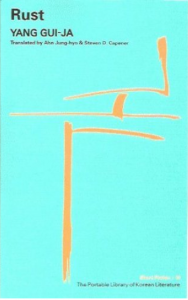Yang Gui-ja’s two stories in the book Rust, which is eponymously named for one of the stories it contains, are Rust and Swamp. If that combination of titles doesn’t let you on a bit as to what Yang is on about, you should probably go to the next room and turn on your television. 😉 Yang’s focus is the inevitable decay of dreams and the quotidian aspects of society that suck us in and destroy us. Stories in which people do not achieve their goals can be highly entertaining. In English I’d mention Death of a Salesman, or even the movie Glengarry Glen Ross. But in Yang’s works there are no highlights, no last minute reveals, no conversational fireworks, no individual feats of derring-do, whether successful or not. Instead society, as symbolized by the subtler forces of nature in Rust implacably and inevitably, pull characters down. In Swamp, nature’s agents are more immediate, thunder and lightening, but nonetheless part of the natural cycle of things.
In Rust, our protagonist/narrator Yi dreams of being a journalist, and has the brass ring almost in his grasp, suddenly has the dream dashed when someone with better connections (Perhaps a degree from a SKY University, or a better friend) gets the job. In partial recompense Yi is given a job in the same firm, but in advertising. He is attempting to steer his life between the Scylla of increasing demands that he sell ads and the Charybdis of his job’s requirement that he ostentatiously lead an affluent life-style. He is required, for instance, to have a car. In a slight act of rebellion (and stinginess) Yi buys his son a bicycle that is not from the most prestigious bike company. Shortly thereafter, the bike begins to rust, and rust creeps into the rest of his life as well. His fight against the encroaching rust is symbol of his attempts to maintain hegemony over his own life. In a way, Rust is a less histrionic version of Tower of Ants. There are no grand gestures, no epic defeats, just the background sounds of time and society sucking a life away. A PDF of Rust can be downloaded here. In Swamp, the protagonist makes Yang’s argument directly, “Lately, I am occasionally struck with a sense of regret that up until now I have lived my life the way other people or life itself have dictated.” (46) This has an interesting semi-equivalency between “other people” and “life.” Interesting to me because the first exigency, people, seems avoidable, while the latter doesn’t. It seems either like a false equivalency, or an argument that ‘people’ are as unavoidable as life. Fair enough, I suppose. In any case, her
cotton-candy thoughts quickly have their air removed when in response to this her husband gives, “a small laugh and replied, with barely passing interest, ‘What kind of books are you reading? Something subversive? (46) Even in a story that takes place largely in a small cottage, Yang continues to take potshots at “corporate” life. The plot is framed. She heads out of town to meet an old friend (this is a massive simplification of their relationship) “five teacher.” While there, another friend of the teacher’s calls and comes over to make the duo a troika. His story is Korean, tragic, and also premised on the notion that there are some things, perhaps everything, that you cannot fight. There is a critical, but subtle, passage in which Yang suggests we are all complicit in our own submissions due to lack of fraternity/sorority. While the narrator is talking to the mysterious stranger about “five teacher,” the narrator is for the first time able to reveal her true feelings about “five teacher.” It is a poignant moment that quickly turns back to a thrashing of corporate life. There is also a relatively subtle, for Korean literature, rumination on nationality (우리 나라) and the historical damage  done by the separation and attendant traumas. I’m developing a theory that female Korean authors are better at dropping this subject into novels/stories while maintaining a superior but semi-parallel narrative. That, I suppose, is for a different post. In any case, the harsh political reveal does not come until, for all intents and purposes, all the action of the story is done. This is clever, for you are already drawn into the personal narrative and desperately want to know why it has gone the way it has. Yang’s writing (and the translation, but Ahn Jung-hyo and Steven D. Capener, neither of whom I can remember translating other works) is clever. When the exported teacher talks about his post-expulsion jobs in the United States he says, “When I first went to America, every job I had had the word helper after it.” That’s a pretty clever take on the bottom of the economic food chain in the US. Two good stories, melancholy modernization lit (as opposed to the antic version of Kim Young-ha or the suicidally depressing version of Cho Se-hui), well written and translated.
done by the separation and attendant traumas. I’m developing a theory that female Korean authors are better at dropping this subject into novels/stories while maintaining a superior but semi-parallel narrative. That, I suppose, is for a different post. In any case, the harsh political reveal does not come until, for all intents and purposes, all the action of the story is done. This is clever, for you are already drawn into the personal narrative and desperately want to know why it has gone the way it has. Yang’s writing (and the translation, but Ahn Jung-hyo and Steven D. Capener, neither of whom I can remember translating other works) is clever. When the exported teacher talks about his post-expulsion jobs in the United States he says, “When I first went to America, every job I had had the word helper after it.” That’s a pretty clever take on the bottom of the economic food chain in the US. Two good stories, melancholy modernization lit (as opposed to the antic version of Kim Young-ha or the suicidally depressing version of Cho Se-hui), well written and translated.





